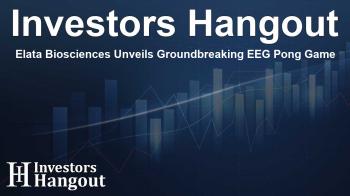Elata Biosciences Unveils Groundbreaking EEG Pong Game

Revolutionizing Gaming with Brainwaves
Elata Biosciences has made a remarkable leap into the realm of technology and entertainment by allowing players to control the classic Pong game using their thoughts alone. This innovative creation is not just imaginative; it's a peek into the future of gaming where the boundaries between mind and machine blur.
The Premier Showcase of a New Era
At an impressive demonstration event, Elata launched its electroencephalogram (EEG) single-player Pong tournament, captivating audiences. This advanced tournament allows participants to manipulate the game without any physical controls, solely relying on their brainwave activity. The event, held during a tech showcase, marked a significant moment in gaming history, showcasing how far technology has come.
The Concept Behind Mind-Controlled Gaming
This advancement eliminates the need for traditional gaming inputs. Players need only to focus their mental energies, successfully converting those thoughts into paddle movements on the screen. As they immerse themselves in the game, the EEG technology translates their intentions instantly, offering a unique and immersive experience.
The AI Driving Brain-Computer Interfaces
Andreas Melhede, co-founder of Elata, views this development as a pivotal moment not just for gaming, but for the future of brain-computer interfaces overall. According to him, standardizing such technology and making it accessible will revolutionize how we interact with digital systems. The public domain release of their EEG technology is aimed at fostering an environment where scientific collaboration thrives, accelerating innovation without compromising user data.
Challenges in Traditional EEG Gaming
Historically, EEG and brain-computer interfaces have grappled with various challenges including fragmented datasets and varying standards that hinder mass adoption. Elata's approach aims to resolve these issues, presenting an open-source model that promises wider accessibility and usability.
How the Technology Works
The lightweight EEG headset designed by Elata captures natural brain activity. Players direct their focus to move the paddle left or right, while the system’s sophisticated algorithms filter out noise, ensuring that only relevant signals are interpreted. This real-time analysis of neural data effectively translates thoughts into precise game movements, maintaining a seamless gameplay experience.
Powering the Future with Open-Source Solutions
Elata's commitment to open-source technology applies not only to gaming but has broader implications across various fields such as neuroscience and mental health. By promoting an open approach, Elata invites a global community to collaborate, ensuring consistent advancements in neurotechnology. The company's vision allows for rapid development cycles and encourages the continuous evolution of brain-computer interfaces.
The Importance of Decentralized Governance
By advocating for decentralized governance in technology, Elata seeks to dismantle barriers that often restrict access to innovative solutions. This methodology emphasizes transparency and community participation in creating applications that could significantly influence mental health treatment and overall brain science.
Looking Forward: The Future of Elata
As Elata Biosciences continues to develop its technology, the possibilities are endless. This groundbreaking EEG Pong game represents only the beginning. The company is dedicated to pushing the limits of what is achievable through brain-computer interfacing, and whether it leads to wider applications in gaming or clinical settings, one thing is clear: innovation is on the horizon.
Frequently Asked Questions
What is Elata Biosciences known for?
Elata Biosciences specializes in developing brain-computer interfaces, allowing direct communication between the brain and computers. Their innovative technology includes a Pong game controlled purely by brainwaves.
How does the EEG technology work?
Elata's EEG technology captures brain activity, interpreting players' thoughts to control in-game actions. The system uses advanced algorithms to filter and translate these signals in real-time.
Why is open-source important for Elata?
Open-source technology allows for greater collaboration, faster innovation, and wider access to advancements in neurotechnology, making it a key focus for Elata.
What are the potential applications of Elata's technology?
Beyond gaming, Elata's technology could significantly impact fields such as mental health treatment, cognitive enhancement, and research in neuroscience.
Where can I learn more about Elata's projects?
Additional information about Elata Biosciences and its ongoing developments can typically be found on the company's official website and through their public communications.
About The Author
Contact Addison Perry privately here. Or send an email with ATTN: Addison Perry as the subject to contact@investorshangout.com.
About Investors Hangout
Investors Hangout is a leading online stock forum for financial discussion and learning, offering a wide range of free tools and resources. It draws in traders of all levels, who exchange market knowledge, investigate trading tactics, and keep an eye on industry developments in real time. Featuring financial articles, stock message boards, quotes, charts, company profiles, and live news updates. Through cooperative learning and a wealth of informational resources, it helps users from novices creating their first portfolios to experts honing their techniques. Join Investors Hangout today: https://investorshangout.com/
The content of this article is based on factual, publicly available information and does not represent legal, financial, or investment advice. Investors Hangout does not offer financial advice, and the author is not a licensed financial advisor. Consult a qualified advisor before making any financial or investment decisions based on this article. This article should not be considered advice to purchase, sell, or hold any securities or other investments. If any of the material provided here is inaccurate, please contact us for corrections.

